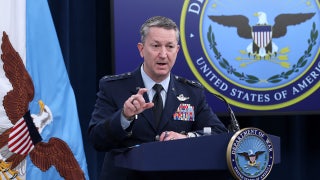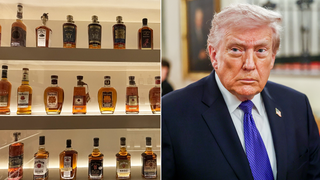
A man drives his taxi past a Cultural Center with the word "Cuba" on it, in Havana, Cuba, Tuesday, April 14, 2015.
New York, N.Y. – U.S. government officials who are playing a key role in firming up ties with the Cuban regime and paving the road to more open trade and travel, say that there have been important strides.
But they stressed that big challenges also loom – among the most formidable is a reluctance by Cuban officials to loosen or cede control over the way business is done on the island, and over telecommunications.
Alex Lee, the U.S. State Department’s Deputy Assistant Secretary for South America and Cuba, said at a symposium on Cuba on Friday in New York City that undoubtedly there’s been “a profound shift in paradigm in relation toward Cuba.”
“We have moved smartly … to initiate a variety of changes,” even amid the restrictions posed by the decades-long trade embargo, Lee said. “The regulatory changes are real significant…we identified areas we want both countries to expand.”
Lee was one of the speakers at the conference called: “Cuba: The Year in Review and a Look to the Future,” jointly organized by Americas Society/Council on the Americas and the CAF Development Bank of Latin America. Speakers included other U.S. government officials involved in restoring U.S.-Cuba diplomatic ties, professors from the University of Havana and organizations that are helping U.S. businesses explore opportunities on the island.
Lee spoke of discussions between the two countries about passenger ferry service from South Florida to Cuba and about opportunities for U.S.-Cuban business ventures in the area of telecommunications.
“We’ve seen some definite moves by the Cuban government in the establishment of Wi-Fi on the island,” he said, while noting that such technology remains financially prohibitive for most Cuban citizens.
“We’re getting very very close to establishing mail service between both countries,” Lee added.
But U.S. officials and businesses want to see more direct dealings with Cuban entrepreneurs, something that officials are not quite ready to step aside in order to facilitate.
The Cuban government, Lee said, still clearly “prefers to channel all business opportunities to state-run enterprises."
He added, “American businesses will face challenges in operating in Cuba. The Cuban government has things to do if it really wants to take full advantage of the opportunities available.”
Cuban officials, as well as the growing number of Cubans who have started, or want to start, their own businesses, have a great learning curve ahead.
U.S. Commerce Department General Counsel Kelly Walsh, who has made several trips to Cuba to hold talks about trade and travel, said Cubans have expressed a need for information and guidance with regard to U.S. regulatory changes since restrictions have been eased by the Obama administration.
Cuban entrepreneurs also have to learn the fundamentals about finances, such as banking and credit, among other things, the speakers said.
Americans visiting Cuba, in turn, “had to learn about the role of Cuban businesses and the Cuban government,” Walsh said, and the impact on the evolving opportunities to conduct business between the two nations.
As for expanding access to, and opportunities in, telecommunications, Lee said, “The Cuban government reaction has been fascinating.”
Cuban officials, Lee said, are “concerned and ambivalent about the Internet” and opening up access to everyday residents.
“Part of that is the paradigm of control,” Lee said, adding that it behooves Cuban leaders to “rethink what’s in their international interest.”
“There were circuitous conversations” about opening up the Internet in Cuba, he said, which is essential to developing global business.
Cubans, however, are quite adamant about maintaining a level of control over the activities of the island’s citizens on the Internet.
“There’s a push-pull in Cuba,” he said. “They’re divided over how they’re going to open up.”
An economy professor, Ricardo Torres Pérez, at the University of Havana said Cuba has made crucial steps to improve the economy, particularly after going through dire times about five years ago.
“It took a great deal of energy to address it,” Torres Pérez said. “We’ve achieved ambitious economic reforms. The mere fact that they’re even talking about private businesses in Cuba and the Internet shows that.”
In an interview with Fox News Latino after his talk, Walsh said that for now, “It’s not their goal to privatize their economy.”
“It’s a state-owned, state-planned economy,” Lee said.
“For U.S. businesses, it’s easier to work in a market-based economy.”
Emilio Morales, president of the Havana Consulting Group, said Cuba was left with little choice but to change, and will have to keep adapting, even against its instincts.
It began suffering major financial losses when the Soviet Union – a longtime lifeline – broke up. Most recently have come the economic problems and political instability in Venezuela, its most recent financial donor, Morales said.
“Cuba has to open itself to the world,” he said. “It has to change its mindset.”












































